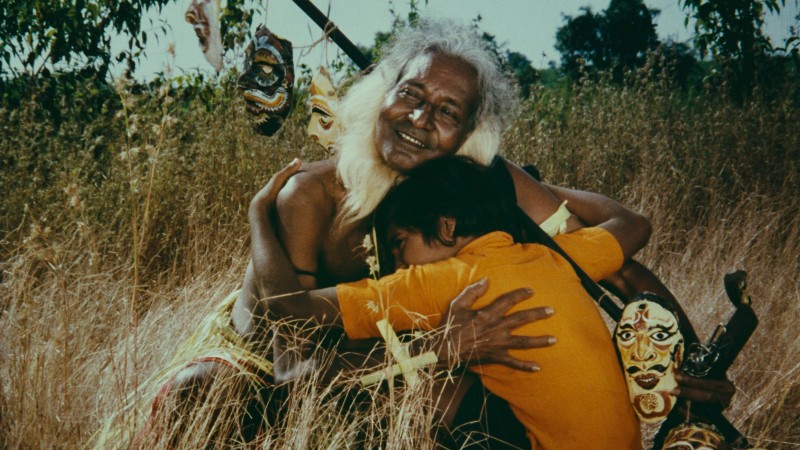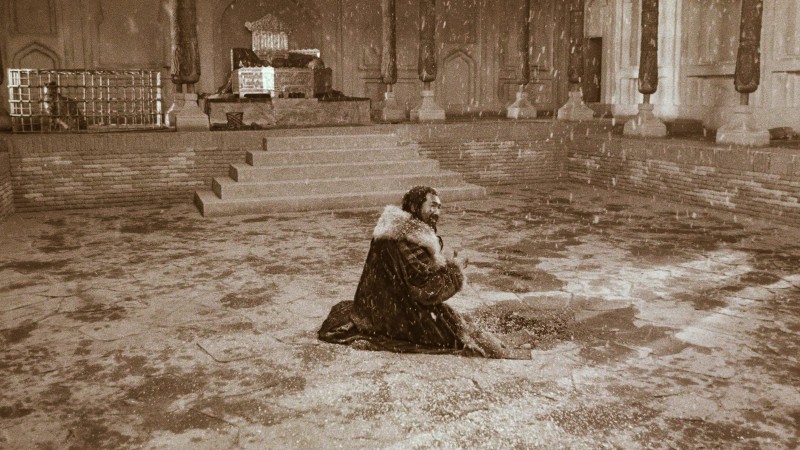Les cousins: The Nature of the Beast

Jean-Luc Godard, lover of paradox, once characterized Claude Chabrol’s Les cousins (1959) as “a deeply hollow and therefore profound film,” a pronouncement, like so many of the pithy mots Godard used to reel off in the pages of Cahiers du cinéma, that is at once outrageously false and weirdly true. Les cousins, Chabrol’s second film, opened in Paris just a month after his first, Le beau Serge (1958), whose release had been delayed by nearly a year, and the movies made a nicely complementary matched set, the second being—not to get too Godardian about it—both lighter and infinitely darker than the first. Chabrol had in fact written both scripts at around the same time but wisely made the less complex of them first. The stories are mirror images of each other: Le beau Serge is about a young man from the city (Jean-Claude Brialy) visiting a friend (Gérard Blain) in the country, Les cousins about a student from the country (Blain) coming to stay with his cousin (Brialy) in Paris, and in each, the new environment proves too much for the luckless visitor. It’s no surprise, in Le beau Serge, to learn that a rural village can be a closed social system, unforgiving to those who can’t adapt to its long-cherished ways. City life is assumed to be more flexible, more accommodating, but in Les cousins, it is nothing of the sort. The Paris Chabrol shows us here is just another, and perhaps deadlier, kind of village.
In its early sequences, Les cousins plays as farce, a Feydeau variation on fable themes. Blain’s character, Charles, the country mouse, moves in with city mouse Paul, a well-heeled, goateed bohemian fop who is pursuing a law degree, as Charles is, but parties a good deal harder than he studies. Paul has an enormous circle of friends, who seem to revolve around him like planets around a bright star whenever he ventures forth to a bar or a café or a social club, but who more frequently come to him in his spacious and smartly appointed apartment; he gathers them there for his amusement, flitting from one to another restlessly and, when ennui finally gets the better of him, playing Wagner on the hi-fi at top volume. He is, not to put too fine a point on it, insufferable, but his wide-eyed country cousin doesn’t, at first, appear to notice—Paul’s life seems so much fuller, richer, freer than the dull provincial existence Charles has always known. He’s attracted to Paul’s glittery existence, and a little frightened by it, and because he is an unusually dutiful young man, he resolves to fit in: he enters into the Parisian frivolity earnestly.
Chabrol is alert to the comic possibilities of this situation, and in the first long party scene, he savors both Paul’s flamboyance and Charles’s fixed-grin awkwardness. The camera moves constantly, in intricate and perilously extended deep-focus panning shots that keep finding the characters in different combinations among the bewildering (to Charles, at least) multitude of guests. Some of these partiers are, inevitably, comely jeunes filles, whom Paul has either already loved and left or not yet gotten around to. Others are the sorts of “interesting” people that bored sybarites tend to collect around them; chief among these is a rather louche, slightly older man of indeterminate means named Clovis (Claude Cerval), who is Paul’s confidant and, at times, coconspirator. Like every party sequence in French cinema since 1939, Chabrol’s owes quite a bit to Jean Renoir’s The Rules of the Game, in which the whirling camera pretends to be as dizzied as the revelers but somehow catches every nuance of their interactions; it moves with the stealth, the false nonchalance of a spy.
That first party in Les cousins sets the tone for the film, which is considerably drier than Renoir’s: as in The Rules of the Game, everyone here has his reasons, but in Chabrol’s world, the reasons are all bad. Paul’s apartment—a studio set—is like a laboratory of human behavior: different elements mix there, in apparently random combinations, and Chabrol, like Paul, observes the reactions coolly, with a curious eye. Early on, there’s a possibility of romance for Charles, whose shyness and sweet-natured seriousness attract the interest of a girl named Florence (Juliette Mayniel), one of the loveliest of Paul’s hangers-on. But Paul takes her away from him, persuading her, with the help of the slimy Clovis, that it is not in her nature to love Charles—that her corrupted soul (and, of course, body) is much better suited to him, Paul. He seduces her and moves her into the apartment, to live with him and his disappointed cousin; and then he sits back and watches.
It’s a cruel experiment, and a macabre parody of the sort of thing film directors do: contriving impossible situations for their characters just to see what these invented people are really made of. (This is a far more defensible technique in art than in life.) As it turns out, Chabrol’s people in Les cousins don’t add up to much: Paul’s a sadist; Florence, lazily, resigns herself to being a plaything; and Charles, with whom all the viewer’s sympathies should lie, remains infuriatingly passive and irresolute. The country mouse throws himself into his studies, squirreling himself away in his room and cramming furiously for his end-of-year exam. But he’s already failed a more important test. For this film, his second experiment as a director, Chabrol brought back his key collaborators from Le beau Serge—those who had passed that first test—and began to assemble, as directors do, a reliable team. The great cinematographer Henri Decaë re-upped for Les cousins, and would shoot the director’s next two films, À double tour (1959) and Les bonnes femmes (1960), as well; thereafter, Jean Rabier, the camera operator on all those movies, became Chabrol’s regular cinematographer. His editor on Le beau Serge, Jacques Gaillard, returned for Les cousins too, and stayed with him through the midseventies. Chabrol took on a screenwriting partner this time, Paul Gégauff, who was a somewhat notorious character in French film circles: by reputation, a cynical, obnoxious right-wing provocateur, rather like Paul. Gégauff wrote sharp, witty dialogue, though, and was remarkable at finding the most disturbing undertones in apparently ordinary, nothing-much-happening scenes. Which is to say that he was an ideal cowriter for the sort of nasty, twisty psychological thrillers that would become Chabrol’s stock-in-trade. Over the next seventeen years, he wrote or cowrote a dozen more of the director’s movies, including Les bonnes femmes, This Man Must Die (1969), and the peerlessly discomfiting Une partie de plaisir (1975), in which Gégauff himself, his real ex-wife, and their real daughter play out scenes from the messy end of their marriage, at least as the writer imagines it—an unpleasant experiment indeed.
And, of course, Chabrol also reenlisted his stars from Le beau Serge, giving each a radically different part to play. In the first film, Blain had the showier role, as a depressive small-town drunk, Brialy the quieter role, as the sympathetic friend and observer. The reversal of the actors’ functions in Les cousins is, you’d have to say, a kind of test. They pass, and then some, because although they’re both good in Le beau Serge, they’re better cast in this film. Blain’s low-key, naturalistic style works well for the hesitant, recessive Charles. Brialy gets to show off his formidable theatricality, the light-comedy technique so pliable that he can, apparently, give it any kind of shading he chooses; he knows how to turn on the charm, and knows how to make that charm sinister, to whatever degree the scene requires. (It’s like watching a great chef adjusting the flame on a gas stove.)
Les cousins, which opened in Paris three months before François Truffaut’s The 400 Blows, was the first box-office hit of the movement that would come to be known as the nouvelle vague; it sold six times more tickets than Le beau Serge had. One of the theaters that hosted the first run of Les cousins, the Colisée, had been the site of the disastrous premiere of The Rules of the Game twenty years earlier; The 400 Blows would open there too, and the success of these New Wave films may have seemed to Chabrol and Truffaut a kind of poetic justice, a belated vindication of their hero Renoir. Chabrol’s triumph didn’t last long, though. His next several movies flopped resoundingly, and by the midsixties, he was reduced to working on cheesy spy thrillers as a director for hire. He recovered his form—creatively and commercially—a few years later with a series of elegant psychological suspense dramas that starred his wife at the time, Stéphane Audran. (She can be spotted in a few scenes in Les cousins.) These movies, of which the best are La femme infidèle (1969), La rupture (1970), and Le boucher (1970), set the pattern for the remainder of what would be a very long and very productive career; by the time of Chabrol’s death in 2010, his filmography ran to better than fifty features. He made many different kinds of movies—historical dramas like Story of Women (1988), the superb occupation documentary L’oeil de Vichy (1993), even a big-budget adaptation of Madame Bovary in 1991—but the type of film to which he always returned was a chilly, ironic, slow-building story of violent death in respectable bourgeois settings. In other words, something like Les cousins.
Chabrol’s second film isn’t a thriller, exactly, in the sense that Le boucher and La cérémonie (1995) clearly are, but it ends with a shocking death, and its dark comedy is the tone that made his later work so distinctive, so unmistakable—that became the signature of his more overtly sanguinary tales. The last grim joke of Les cousins blooms, characteristically, at its very end: you realize, in the hushed final shots, that you’ve been watching a movie about two law students in a world whose laws are arbitrary, unknowable. The pessimism of this is so staggering that you can only laugh. Les cousins, hollow and profound, is a completely successful experiment. It’s the movie in which Claude Chabrol discovered his nature.




